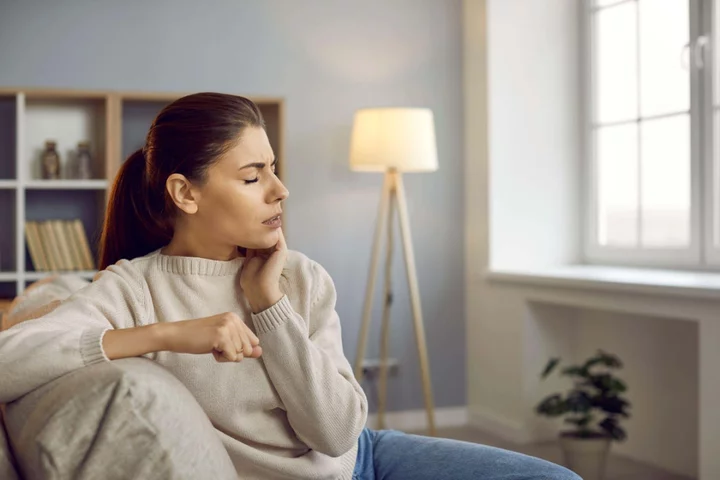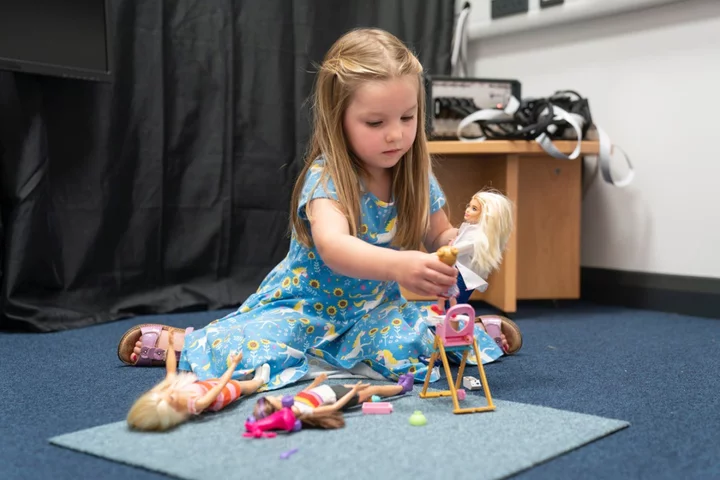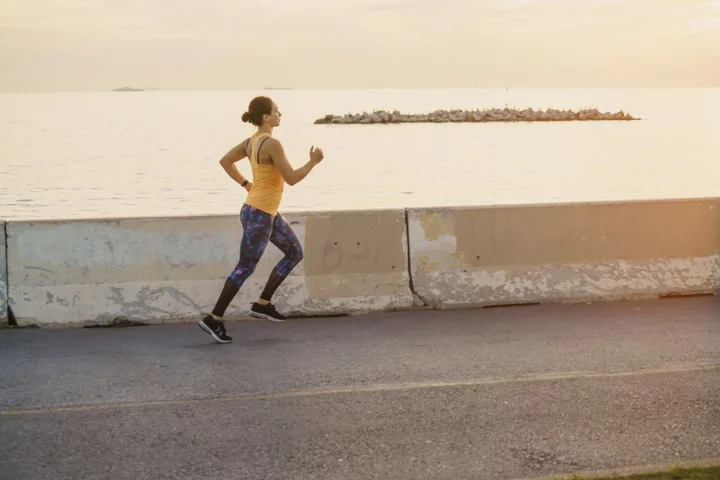
These Iowa and New Hampshire voters don't see much changing after the second GOP debate
Jaclyn Taylor's search for a candidate got a little more complicated Wednesday night. Chris Mudd, on the other hand, ended the night exactly where he began.
2023-09-29 19:28

From tiredness to sweating – subtle warning signs something could be wrong with your heart
People can go years with no idea they have something wrong with their heart. Symptoms can be vague and subtle and many heart conditions are ‘hidden’ – meaning they’re not obvious from the outside. “Hidden heart conditions often go undiagnosed for too long, until something goes wrong or it’s too late,” says Sindy Jodar, senior cardiac nurse at the British Heart Foundation (BHF). “That’s why it is important to never ignore the signs of heart disease and get yourself checked, just to be sure.” While some warning signs are easy to spot – such as severe chest pain and collapse – there are also many little indicators that something could be wrong with your heart or circulatory system. These won’t necessarily mean you have a heart problem, but it’s always best to have them investigated. From tiredness and nausea to fainting, here are some of the less obvious symptoms everyone needs to know about… 1. Feeling unusually tired Dr M Adil U Khan, a GP at Pall Mall Medical, says you should not “ignore or downplay unusual levels of tiredness”. While it’s normal to feel exhausted if you’ve been very busy or lacking sleep, he adds: “Feeling unusually tired, especially if it’s not related to exertion, should be investigated.” It could be due to something like anaemia, a virus, or even linked to mental health. It could also be related to your heart, so it is important to have it investigated. 2. Subtle discomfort “Look out for subtle discomfort in different areas of your body, including discomfort or pain in the jaw, neck, back, or stomach, which can be associated with a heart problem,” says Khan. If symptoms are out of the norm for you and aren’t going away, it’s always best to get them checked. 3. Unusual swelling Perhaps you have noticed your ankles look particularly puffy, or maybe it’s your general tummy area that’s constantly swollen for no apparent reason. “Unexplained swelling, known as oedema, in the legs, ankles or abdomen, may also be signs of heart failure,” explains Khan. 4. Vomiting and a choking sensation Sudden vomiting or a choking sensation in your throat is something to be wary of too. “While not every bout of nausea means there could be something serious happening, feeling sick combined with other aches and pains, such as severe chest pain, should ring an alarm bell,” says Jodar. Yes, it could be a stomach bug, but if you are having sudden spells of vomiting and nausea more regularly and you’re not sure why, don’t delay in get things checked out. 5. Fainting If you experience sudden fainting, this is a big indicator of something being awry. “If fainting or any other symptom becomes a problem, consult a healthcare provider and schedule an appointment with a doctor or cardiologist,” says Khan. “Discuss your symptoms, medical history and risk factors with them. “Your healthcare provider will assess your vital signs and perform a physical examination. Depending on your symptoms and risk factors, you may undergo diagnostic tests like ECGs, echocardiograms, stress tests, blood tests, or more specialised cardiac assessments,” he adds. 6. Shortness of breath Struggling to catch your breath is not a trivial matter. “Anyone experiencing shortness of breath during everyday activities or at rest should see their doctor,” says Khan. This is especially the case if it’s accompanied by chest pain – even if it doesn’t seem especially severe. Khan adds: “Mild chest discomfort should always be investigated, but some people mistake this for indigestion or muscular pain.” 7. Unusual sweating “Feeling hot, clammy and quite sweaty when you haven’t been doing strenuous exercise shouldn’t be ignored,” adds Jodar. “If this is combined with chest pains, it’s important you get yourself looked at.” 8. Heart rate irregularities Does your pulse sometimes feel jumpy or too fast? Get it checked with your doctor. Khan says: “Smartwatches and fitness trackers can provide valuable data about your heart rate and may detect irregularities to some extent. They can help track general trends in heart rate, especially during physical activity or rest. “However, they are not a substitute for medical-grade monitoring and evaluation… Any concerning symptoms should be evaluated by a healthcare professional for a comprehensive assessment and diagnosis,” Khan adds. Read More Charity boss speaks out over ‘traumatic’ encounter with royal aide Ukraine war’s heaviest fight rages in east - follow live Breast Cancer Awareness Month: 9 brilliant beauty buys supporting good causes Smokers 2.6 times more likely to give birth prematurely Female students ‘more than twice as likely’ to be affected by poor mental health, research shows
2023-09-29 15:57

Wolves vs Man City - Premier League: TV channel, team news, lineups & prediction
Evertyhing you need to know about Wolves vs Man City in the Premier League - including how to watch, team news and score prediction.
2023-09-29 05:57

Playing with dolls could help a child’s social development
Playing with dolls could help the social development of children - including those with neurodiverse conditions such as autism, according to a study. The research, from Cardiff University, found children exhibiting higher levels of autism traits showed increased brain activity in a key region associated with social processing when engaging in conversations with individuals during doll play. The new findings suggested that broader social engagement with others while engaging in doll play was a unique pathway to social development for these children. This was in contrast to what was observed in neurotypical children, who were more likely to discuss the dolls’ thoughts and emotions. However, researchers said that despite this difference, it showed that both groups may be able to benefit from doll play by using it as a tool for practising social scenarios and developing social skills, such as empathy. The findings are the latest release from a multi-year study by the Centre for Human Developmental Science at the university’s School of Psychology. Previous years have focused on neurotypical children and found wide-ranging social and developmental benefits of playing with dolls. Now, in its third year, the research team has replicated those results with a more diverse range of participants, including children aged between four and eight displaying both high and low levels of traits associated with autism. Lead researcher Dr Sarah Gerson said: “Our study shows that doll play can encourage social processing in children, regardless of their neurodevelopmental profile. “The findings show that all children, even those who display neurodivergent traits commonly associated with autism, may use doll play as a tool for practicing social scenarios and developing social skills, such as empathy.” State-of-the-art functional, near-infrared spectroscopy equipment was used to explore brain activation while children played with dolls and on tablets, both by themselves and with another person, replicating conditions from the first year of the study. While observing children, researchers saw increased brain activity in the posterior superior temporal sulcus (pSTS) region - which is heavily involved in social and emotional processing such as empathy - when playing with dolls, for both play with a social partner and during solo doll play, but less so during solo tablet play. The study’s results suggest that doll play could support social processing, regardless of a child’s neurodevelopmental profile, but through different pathways. For children displaying fewer autistic traits in the research, talking about the mental states and emotions of the dolls they were playing with was associated with increased pSTS activity. In contrast, for those displaying more autistic traits, talking with others during doll play, even when playing by themselves, led to more social processing on a neural level. Other research has shown that social processing and empathy skills are important determinants in children’s future emotional, academic, and social success. The study was a collaboration with the Wales Autism Research Centre. ‘Create a more inclusive and supportive environment for their development’ Its director Dr Catherine Jones said: “The study reinforces how it is important that that we acknowledge and value neurodiversity. “This means recognising and valuing the diverse ways in which children’s brains work and approaching social development in a way that is inclusive and accommodating for all children, regardless of their neurodivergence. “By embracing all ways that children choose to play, we can create a more inclusive and supportive environment for their development.” Since the landmark publication of Piaget’s theory of cognitive development, the effects of play have been thought to be positive for kids’ social skills and creativity, but this has never been scientifically evidenced at the brain level. The multi-year long-term study, commissioned by Barbie, is the first time key Piaget theories on play have been scientifically evidenced via brain imaging and the first to use neuroimaging evidence with natural doll play, meaning there was no prescribed storyline to show how the brain is activated during doll play. Michael Swaisland, head EMEA of insight and analytics, Mattel, said: “We are proud to know that when children, regardless of their neurodevelopmental profile, play with Barbie, their playtime may benefit their development. “As Barbie continues to inspire the limitless potential in every child, we are delighted to know, through neuroscience, that playing with dolls may encourage the development of social skills such as empathy in children, including those who display neurodivergent traits commonly associated with autism. “We look forward to uncovering even more benefits of doll play through our long-term partnership with Cardiff University as we look to shine a light on the benefits the play pattern has towards development, that parents might not have been aware of.” Parents and caregivers can visit here to learn more about the research and access resources. Read More Toys children play with can have an effect on their success in adulthood The best exclusive discount codes this payday Many parents of under 5s on less than £50k ‘quit work due to childcare costs’ – survey
2023-09-28 17:49

Some children avoid sleepovers due to fears of wetting the bed
Eight in 10 children who experience bedwetting have never attended a sleepover - because they’re too embarrassed. A survey of 742 adults, with children aged 4-11, found that 69 per cent of kids have turned down an invite to a sleepover party. And nearly as many (67 per cent) of parents have declined an invitation on behalf of their child. To help parents and kids deal with the experience, and help kids make friends and gain independence through sleepovers, Pampers Ninjamas teamed up with Dr Ranj Singh on educational and fun content discussing bedwetting, and how to prepare for nights out of the home. The three-part series provides education about why bladder leaks can happen, as well as practical tips on how to manage them, particularly during sleepover moments. Paediatrician, TV presenter and author Dr Ranj, said: “Sleepovers can play an important role in developing the confidence and independence of children, as well as for their enjoyment. “So I am proud to be helping the 82 per cent of children who are currently missing out, to offer practical advice as to how to better prepare for overnight stays with friends and family.” The research also found more than a quarter (26 per cent) of respondents are not comfortable discussing bedwetting with parents hosting sleepovers. And 35 per cent report an increase in bedwetting before going back to school, suggesting scholastic stress could be a trigger. To combat the situation, 76 per cent have invested in a waterproof mattress, while 68 per cent have purchased nappies for older children. Read More Playing with dolls could help a child’s social development Study finds free childcare reform has ‘little benefit’ to poorer families Most children in kinship care living with at least one grandparent, figures show
2023-09-28 17:45

Female students ‘more than twice as likely’ to be affected by poor mental health, research shows
Female university students are more than twice as likely as male students to say they have been affected by poor mental health, new analysis suggests. Data shows 12% of female students say they have been affected, compared to 5% of males. Reported mental health problems among university students have almost tripled in recent years, according to the analysis. The percentage of undergraduate students at universities across the UK who said they had experienced mental health difficulties rose from 6% to 16% between the 2016/17 and 2022/23 academic years. It means one in six undergraduates now reports experiencing mental health challenges. The findings suggest further action should be taken to prevent mental health difficulties arising wherever possible, and that services are adequately resourced to support students quickly when they need help Professor Michael Sanders, King’s College London Analysis by the Policy Institute at King’s College London and the Centre for Transforming Access and Student Outcomes in Higher Education (TASO) found a significant part of this increase occurred in the last 12 months, a period during which the cost-of-living crisis intensified. Poor mental health is by far the most common reason for students wanting to drop out of university. Among those considering dropping out, the proportion citing financial distress as the main reason has risen from 3.5% to 8% between 2022 and 2023. But the general upward trend in mental health problems predates both the rise in inflation and the Covid-19 pandemic, indicating that other factors are likely to be at play, researchers said. The analysis – which drew on a dataset of 82,682 full-time UK undergraduates over seven years – shows some groups are more affected than others. Of the non-binary respondents, 42% said they have been affected by poor mental health, along with 30% of trans people. Bisexual people (28%) have the highest average levels of mental health difficulties among LGBTQ groups across the data, while gay men (14%) have the lowest – although this is still greater than the level seen among straight people (7%). White students (12%) have on average worse mental health than their peers from other ethnicities, but those with a “mixed” ethnicity (12%) are just as likely to have mental health difficulties. Undergraduates who attended state schools (15%) have on average worse mental health than their peers who attended private school (11%), while students who get most of their money through a maintenance loan, grant or paid work are more likely to have mental health difficulties than those on scholarships or with family support. Michael Sanders, professor of public policy at the Policy Institute and author of the study, said: “It’s clear the experiences of mental ill-health among students are deeply unequal, and exist along much the same lines as in society at large, with those from the most disadvantaged backgrounds or who often face discrimination being most likely in general to report struggles with their mental health. “The findings suggest further action should be taken to prevent mental health difficulties arising wherever possible, and that services are adequately resourced to support students quickly when they need help.” Dr Omar Khan, chief executive officer of TASO, said: “This report highlights the persistent and widespread mental health challenges faced by students. “While Covid and the cost-of-living crisis have clearly exacerbated such challenges, the upward trend is not new. “We’re working with the higher education sector to better understand what works to improve mental health outcomes for all students.” It comes as a separate report from the NHS Race and Health Observatory calls for more mental health support for people from Gypsy, Roma and Traveller Communities in England. It said that it is estimated that suicide rates among these groups are up to seven times higher than in other communities. Dr Habib Naqvi, chief executive of the NHS Race and Health Observatory, said: “We know that Gypsy, Roma, and Traveller communities face stark challenges in accessing psychological therapies and other mental health services. “This report lays bare the mental health issues and stigma faced by these communities first hand.” Read More Charity boss speaks out over ‘traumatic’ encounter with royal aide Ukraine war’s heaviest fight rages in east - follow live Many parents of under 5s on less than £50k ‘quit work due to childcare costs’ – survey 5 trainer trends that will be everywhere this autumn 11 ways to work autumnal wonder at home
2023-09-28 16:59

Harry Potter star Bonnie Wright announces birth and name of first child with Andrew Lococo
Bonnie Wright has announced the birth of her first child, sharing the baby’s name and first photo with her social media followers. The 32-year-old actor is best known for playing Ginny Weasley in the Harry Potter film series, which concluded in 2012. In April, she and her husband Andrew Lococo told fans that they were expecting their first child together. On Wednesday (27 September), Wright shared that she’d given birth at home last week, along with a photo of the newborn asleep under a blanket. “Say hello to Elio Ocean Wright Lococo, born at home on Tuesday 19th September,” Wright’s caption began. “We’re all healthy and happy. Andrew and I are so in love with our sun,” she wrote, adding a sun emoji. She continued her caption by praising the doula, midwives, doctor and other maternity professionals for their “amazing” work. “So grateful for our birth team that have held our hands throughout and made the journey so joyous and expanding,” Wright continued. “Birth is the wildest experience!” The actor and writer concluded her caption with a short tribute to Lococo. “Lastly thanks to Andrew my rock throughout birth quite literally as I squeezed onto you so tight and you never wavered. Elio has the most tender loving papa.” In response to the post, many fans and friends of the film star shared warm wishes in the comment section. Evanna Lynch, who played quirky Hogwarts student Luna Lovegood in four Harry Potter films, is one notable figure to have left a congratulatory message – and pointed out an unexpected link to the wizarding franchise. “Awwww congratulations Bonnie and Andrew!!! Welcome to Earth, Elio Ocean!!! ps. Hermione’s birthday twin, I’m sure you’ve been told!!” the Irish actor wrote. Others were quick to make references to the film series, with several naming the birth as the arrival of “another Weasley”. In August, Wright posted photos and video from her and Lococo’s “baby moon” in Laguna Beach, California, as they celebrated their “last quiet holiday as just two”. The couple married on 19 March 2022, a day that Wright has since described as “the best day of my life”. In an interview with Brides magazine earlier this year, she spoke about how her passion for sustainability was reflected in their choices for the ceremony, as well as in her vintage, century-old wedding dress. “The dress didn’t have the original underdress with it as it had likely perished – it being 100 years old!” she explained. “So when I was first trying it on, it was completely see-through. It was quite funny having to imagine the underdress we would end up making for it.” Read More Bonnie Wright admits feeling ‘anxious and frustrated’ by Harry Potter screen time Harry Potter star Bonnie Wright shares new details about her 100-year-old wedding dress Harry Potter star Bonnie Wright announces she’s pregnant with her first child Nick Cannon candidly admits Mariah Carey saved his life amid lupus diagnosis The best napping method to help with pulling an all-nighter Toys children play with can have an effect on their success in adulthood
2023-09-28 15:27

Casemiro continues to be brilliant for Manchester United
Manchester United
2023-09-28 00:26

The 15 best goal-scoring seasons in Premier League history
Erling Haaland made history last season by scoring a record-breaking 36 goals in a Premier League campaign. Here are the rest of the best scoring seasons in Premier League history.
2023-09-27 23:19

Brazil's central bank chief says tight policy needed despite inflation slowdown
BRASILIA Brazilian central bank chief Roberto Campos Neto on Wednesday said policymakers need to persevere in anchoring inflation
2023-09-27 22:48

The best napping method to help with pulling an all-nighter
Pulling an all-nighter for an exam? Or do you work night shifts that you just can’t avoid? Well, researchers have revealed the optimal napping method to help combat fatigue during a 16-hour overnight duty. The research looked at data from pilot studies on night shifts conducted from 2012 to 2018 and found that the analysis could also be the key to providing relief for sleep-deprived mothers and fathers. The team found that scheduling two nap sessions – a 90-minute nap followed by a quick 30-minute nap later – is the optimal choice over a single 120-minute rest for delaying fatigue and sleepiness. “A 90-minute nap to maintain long-term performance and a 30-minute nap to maintain lower fatigue levels and fast reactions, as a strategic combination of naps, can be valuable for early morning work efficiency and safety,” said study author Sanae Oriyama, a nursing science professor at Hiroshima University’s Graduate School of Biomedical and Health Sciences. The study, published in the journal Scientific Reports, found that many professions, including those in emergency sectors, have a lot of night shift work which can in turn increase the risk for sleep-related physical and mental health disorders and impair job performance. When daytime comes, the human body has a light-sensitive internal clock that activates wakefulness, and at night, this pushes the human body towards sleep. Study authors say because of this, the likelihood of errors and accidents during a night shift is elevated. In the medical field, this may inadvertently lead to serious harm to patients or to oneself, and naps are usually taken by shift workers to offset disruptions to the body clock. For the study, researchers looked at 41 women in their 20s who underwent a simulated 16-hour shift in a controlled environment, where factors, such as light and temperature, were standardised. Participants underwent hourly tests, including the Uchida-Kraepelin test (UKT) for assessing task speed and accuracy, and measurements of drowsiness, fatigue, heart rate and blood pressure. Professor Oriyama found that women who took a single 120-minute nap suffered increased drowsiness from 4am onward. Those who had two naps, a 90-minute nap followed by a 30-minute nap, postponed their drowsiness until 6am. Researchers suggest adding an extra 30 minutes of shut-eye between 5am and 6am, given that drowsiness might shoot up from 7am to 8am. All nap participants reported fatigue between 4am and 9am, whereas the dual-nap group reported less intense fatigue. “During a night shift that, for example, lasts from 4pm to 9am the next morning, a split nap of 90 minutes and 30 minutes, ending at 12am and 3am, respectively, is thought to be more effective than a 120-minute monophasic nap ending at 12am when tasks requiring quick responses to maintain a high level of safety are scheduled between 2am and 9am.,” Professor Oriyama said. The study also revealed that the duration of the nap plays a crucial role. The later you take it, it will become more difficult to fend off sleepiness and exhaustion. However, delaying it too much could interfere with your focus as your sleep drive builds up. “Hence, the ideal time for taking a nap and the ideal nap schedule during long night shifts need further elucidation,” Professor Oriyama added. Read More Why is my teenager sleeping so much? Sounds that can help you fall asleep better How to sleep during hot weather, according to experts Sounds that can help you fall asleep better How to spend the perfect healthy Super Saturday – according to science Summer of female sporting events inspires millions of women to get back into the game
2023-09-27 21:51

Summer of female sporting events inspires millions of women to get back into the game
A bumper summer of female sporting events has inspired millions of women to get back into sports after years of fear and judgement. Encouraged by competitions such as the FIFA Women’s World Cup, the Women’s Ashes and Wimbledon, 59 per cent of women have started training with an old sports team again. A poll of 2,000 females aged 18-65 found 46 per cent feel motivated to try sport after seeing the empowerment and determination showed by these professional female sporting stars. It also emerged 31 per cent of women over 45 played sports when they were younger but dropped out as a teenager, with being ‘too sweaty’ and not feeling ‘good enough’ to take part among the top reasons. But now, many are dusting off their boots, digging out their racquets and getting back to action. Sure UK, a supporter of women’s sports, commissioned the research after launching the Breaking Limits: Girls Can Football Series, which aims to provide funding and training to give young people access to sport coaches, communities and safe spaces. Former Lionesses goalkeeper Carly Telford, who is partnering on the campaign, said: “Too many women have missed out on years of enjoyment, fitness and socialising due to feeling unable to continue with team sports and it’s about time they feel inspired to get back into the sports they enjoy without fear. “There’s still a long way to go and so much more that we need to do to promote women’s sport in all corners of the world. “To normalise women succeeding on pitches, courts and fields should be everyone’s goal, and both consumers and organisations have roles to play to make this a reality.” The study found there is more to do though, with 77 per cent of women believing that society needs to promote female sporting role models. While 36 per cent worried about being treated differently to men if they were to participate in sports, leaving 64 per cent put off trying sports altogether as a result. But putting worries aside, the future of women in sport looks bright, with the most popular sports they’d like to be involved in named as football (37 per cent), netball (21 per cent) and athletics (15 per cent). A quarter voted netball as the most inclusive sport for women, followed by athletics (15 per cent), and football (15 per cent). And half believe women’s football will eventually be as popular as men’s football – if not more. For 74 per cent, playing as part of a team has worked wonders for their mental health, while 51 per cent said sports has had a positive influence on their life overall. As 46 per cent of those polled, via OnePoll, feel motivated to try a sport after seeing the empowerment and determination showed by the sporting stars. ‘Movement has the power to transform lives’ Alice Duffill, from Sure UK&I, said: “Movement has the power to transform lives. “Everyone should be able to experience all the incredible physical, mental and social benefits movement bring - whoever you are, however you move. “But in our increasingly unequal societies, social, economic, and physical barriers stand in the way. “Inspiring women and girls to play sport through promoting and raising awareness professional athletes who look like them is key in breaking down some of those barriers. “That’s why we’re committed to growing women’s sports as we know the importance of shining a light on professional women athletes to help inspire today’s and tomorrow’s girls”. Read More Study links ultra-processed food and drink to risk of depression in women Study finds women only give themselves 30 minutes of self-care a week Women respond to viral TikTok prompt asking about ‘female version’ of male Roman Empire obsession The cure for smelly garlic breath? Turns out, it’s simpler than you think Teenager’s death after drinking too much water was ‘preventable’ Could bats hold the secret to beating Covid and cancer?
2023-09-27 20:22
